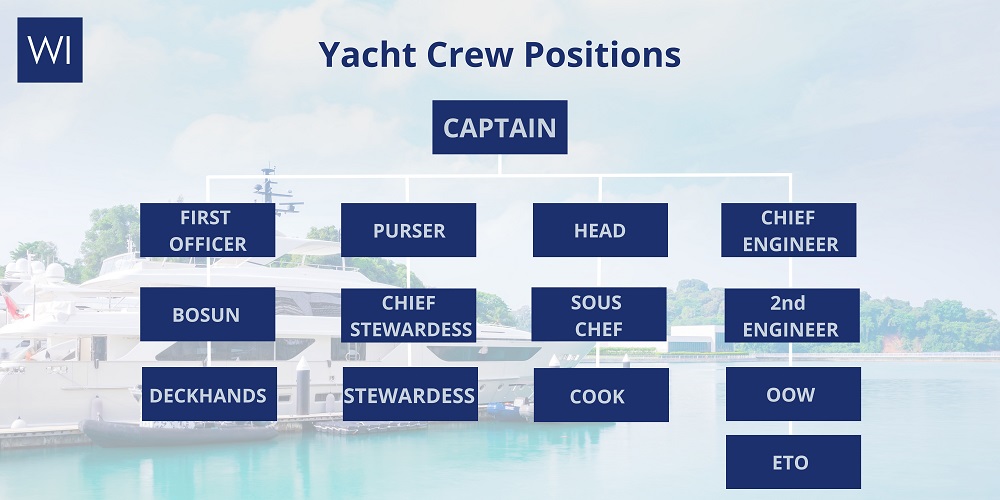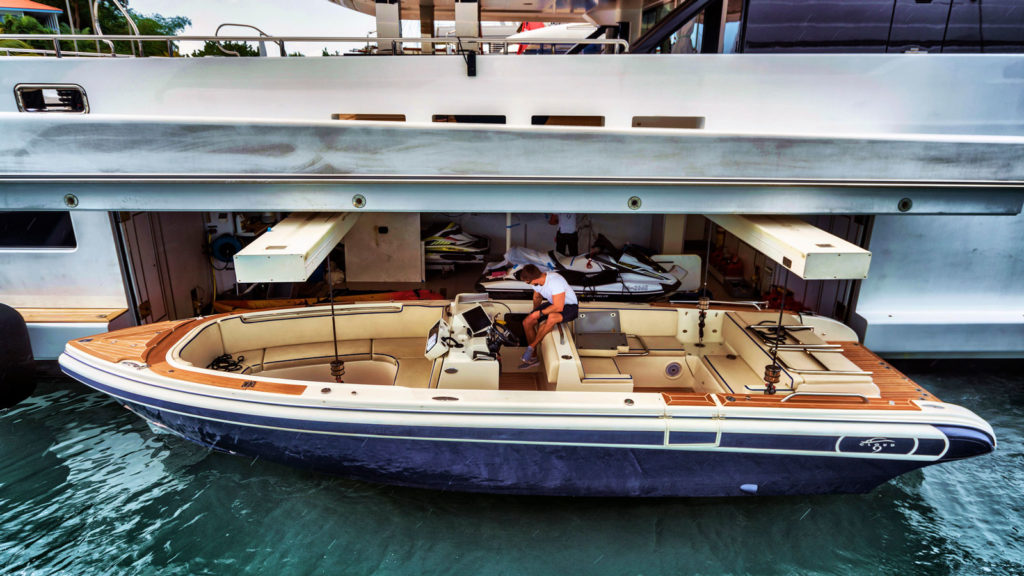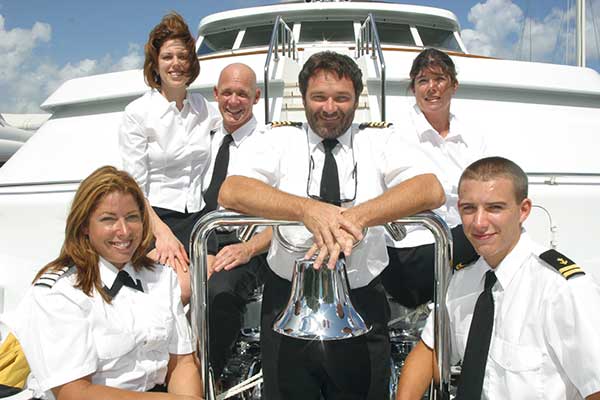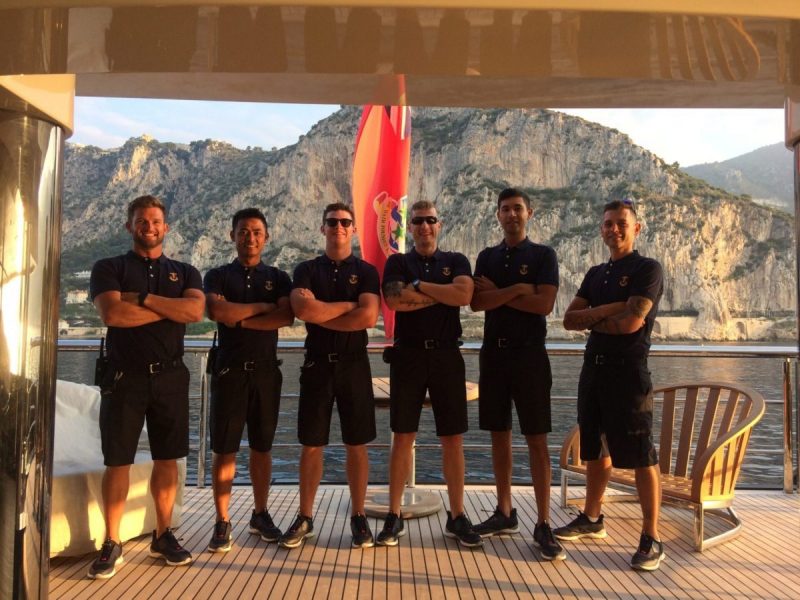Essential Guides
Ocean Mapping
New to Yachting
- Apr 13, 2023
YPI CREW, a leading yacht crew recruitment company, has released its 2023 Yacht Crew Salaries Report following a positive and fast-paced year in yacht crew placement. The report outlines trends in the industry and emphasizes the importance of flexibility in attracting top talent.
2022 marked a significant shift in the yachting industry, as the effects of Covid-19 began to wane. One key trend that emerged was the extension of scheduled or rotational leave to positions outside of the engine room and the bridge. Crew members are increasingly focused on achieving a harmonious work-life balance, leading yachts to adapt their leave packages to remain competitive. Flexibility with regards to leave has become a key factor for all departments and allows for a larger pool of candidates who are fully committed to the yacht, its programme and owner.
Read the full Yacht Crew Salary Report HERE .

Both the Deck/Bosun's and the Interior/Galley Departments have witnessed a steady trend towards increased leave packages. Senior Stews, for example, now seek a minimum of 90 days leave, and 95% of Chief Stews look for full rotation. Stew Head of Departments have come to realize the benefits of scheduled or rotational leave, a perk that was once reserved for Engineers or Officer/Captains Departments. Additionally, and in order to compete with the larger yachts, an important number of yachts under 70metres are now also considering increased leave packages to secure top crew. It's important to note that the salaries listed in the report are median range salaries and can vary based on factors such as job-specific skills, professional qualifications, and experience.
YPI CREW now offers a bespoke service for our yacht clients to assist with salary reviews and comparative analysis. Contact Chloe Collet at [email protected] for any further information.

Most read articles

Tips & Tricks
How many crew members are needed on a yacht?

How to Find A Caribbean Yacht Job

Yacht Job Offers
Open yacht crew jobs in March 2023

How to Become A Yacht Purser: Interview with Purser Trainer Angela Wallace


YACHT CREW GUIDES
IS YACHTING THE RIGHT CHOICE FOR ME?
Essential yacht guides

Mandatory certificates

What you need to know about B1/B2 visa

How to prepare for a yacht interview?
Read more latest news

YPI CREW Will be Attending the Superyacht Technology Network Conference in Barcelona

Is a career in the yachting industry a good fit for me?

Webinar Friday, 15th March: How to Start Your Yachting Career as a Superyacht Stew?

YPI CREW Releases 2023 Yacht Crew Salaries Report
INDUSTRY NEWS

HOW TO WRITE A MEMORABLE YACHTING CV

YACHT CREW SALARY GUIDE
Error 404 — page not found, we’re sorry, we couldn’t find what you were looking for.
Please return to the YPI CREW homepage
Let’s get started. Call us on +33 (0)4 92 90 46 10 or email us.
Our mission, vision and values, mlc 2006 compliance, essential guides, yacht crew positions.
Chief Officer
Second Officer
Third Officer
Chief Engineer
Interior Crew
Head of Service
Head of Housekeeping
Specialist Positions
Spa Manager
Spa Therapist
Personal Trainer & Yoga Instructor
Hairdresser
Mandatory Certificates
B1/b2 visa information, how to write a memorable cv, how to prepare for an interview, yachting seasons, yacht crew salary guide, is yachting the right choice for me, cv templates, ocean mapping, new to yachting.
+33 (0)4 92 90 46 10
- Yachting for beginners
- Owning a yacht
- Motor Yachts
- Sailing Yacht
- Indian Ocean
- Mediterranean
- Buying or Selling a Yacht
- Yachting Events
- FAQ – Luxury Yacht Charter
- FAQ – Buying a Yacht
- FAQ – Sell your Yacht
- How Much Does It Cost To Charter A Luxury Yacht?
- All our Blog Post & News

Yacht crew positions : Hierarchy, Missions & Salaries explained

Like any well-run hotel, restaurant, or other luxury service, a crewed yacht needs organized structure and good management. Whether you’re staffing your own luxury vessel or looking for an exciting career working and traveling the world, you need to know how this structure works, and what you can expect to pay or earn and do in the various roles on board.
Every yacht is a little different, and organization may reflect the style of the captain or the demands of the owner. But the same jobs need to be done on almost every boat. Organized with ranks, heads of each division report to the Captain. It’s not a military-style organization, but there are parallels with merchant marine grades and structures.
Smaller yachts need fewer crew, and staff may wear multiple hats that cross more traditional divisions and may combine some jobs with others. Large yachts have more distinct divisions or subdivisions, with more specialization to divide tasks and manage staffing. The core skills are the same, but finding staff with the right blends to do the jobs is key. Crew with broader skills are highly sought after.
As a yacht owner, you shouldn’t have to worry about day-to-day management decisions or organizing all this. That’s why you have a captain, and it’s better to leave staffing decisions entirely up to him or her. But it’s still important to know what it is people you’re hiring do, why they’re there, and how many you need. You don’t want too many crew, or to be short-handed. An understanding of what your yacht needs helps you talk to the captain to keep your yacht running how you want it.
For those looking to break into yacht crew work, consider your skills and strengths, and what jobs appeal to you. You’ll need training before you work, and you can direct your job path through the training you seek. Your goal is a suitable position on a well-run yacht, so make yourself the most attractive candidate possible.
Yacht Work Life

Working on a yacht is also living on the yacht. Crew must have a space to sleep, food, and all the basics that any employee needs. Large yachts have space reserved for crew, and owners looking for quality crew should provide good working and living conditions. Your crew takes care of you, and you should take care of them.
Depending on where a yacht operates or what flag she flies, a variety of labor laws or rules may be in effect. These requirements may be for work visas, contracts and written agreements, and compliance with merchant and ship crew treaties and laws. Be prepared to have work and non-disclosure agreements between yacht and crew, though a few yachts skip this.
Seasonal Jobs
Many yacht positions are seasonal. Year-round employment is more likely for senior crew like the captain and department heads, but not all yachts see year-round use. And some yachts may use different crew in different locales between seasonal moves.
Any job listing should give seasonal information, with geographic information, the length of the season, and the prospects for year-round positions and repeat employment.
Hours, Salaries, and Expectations
Yacht crew is a service job at its core, and every yacht owner is looking for service-oriented people who understand how to deliver a hotel-quality living and restaurant-quality fine dining. Work experience in luxury hotels and restaurants is a big plus for some jobs, and makes breaking into yacht work easier.
Yacht work can be very demanding, with periods of intense work when the owner and guests or a charter party is on board. Long days aren’t uncommon, but often balance with slack time when the boat is empty of passengers. There is always work to be done, but there’s usually a chance for time off.
Most salaries are monthly, since many positions are seasonal. Pay ranges are commensurate with experience, rank, and responsibility. Private vessels usually offer higher base pay, as charter crew can earn tips on top of their base salary. Because of the demands of the lifestyle, compensation is good and you have minimal living expenses on board.
Benefits and Time Off
Because so many jobs are seasonal and may occur in different countries and locations, benefits offered to yacht crew vary widely. But it is not uncommon for crew to be offered health and accident insurance and a flight to the vessel. Living on board, you’ll get food, rooming (usually shared), basic toiletries, uniforms, and laundry. Yachts with a longer view may offer additional training to long-term prospects.
Time off is usually linked to boat use, and may be sporadic in-season or when the boat has the owner and guests on board. There will always be some time off, but it may be between very intense work periods.
Most crew jobs have an employment contract that meets the Maritime Labour Convention 2006 (MLC). This should spell out the contract period and duration, as well as salary, leave and time off, probationary periods, repatriation policies, and any other crucial details to meet the minimum international standards of crew welfare.
This contract should also contain shipboard policies on confidentiality and non-disclosures, drug and alcohol use on board, personal hygiene expectations, interpersonal relationships, and dispute resolution. Job expectations and requirements can also be included, with specific language about roles, tasks, and cooperation between divisions.
Note that all crew agreements will explicitly prohibit drug use on board, most limit alcohol consumption and ban hard liquor on board, and many boats have policies prohibiting intimate personal crew relationships. Because the crew is living on board full time and in close quarters, rules to maintain decorum and crew harmony may be in writing.
Training & Certificates
Two key certifications are required for yacht crew. Employers look for the STCW (Standards of Training, Certification and Watch-keeping for Seafarers) and the ENG1 (Seafarer Medical Certificate). Insurers generally require crew to have these two certifications or the equivalent.
The ENG1 isn’t a class. It’s a medical exam to ensure that the crew is physically fit to serve at sea and has no underlying conditions that may arise far from help. It’s best for prospective crew to secure the ENG1 before investing more time and money training.
STCW is a week-long class on the basics of onboard safety. This includes hands-on modules covering personal survival, fire safety, first aid and CPR, accident prevention, and security awareness. It needs to be refreshed every five years.
Shared, Hybrid, and Crossover Jobs
Larger vessels will have more defined duties and specific areas of responsibility. But smaller yachts may want the crew to have different roles in different situations. For example, a hybrid job description may read “3rd Engineer/Steward” and describe a role in engineering when the boat is empty but on inside crew when passengers are on board.
When hiring or seeking jobs be prepared to look for creative crossover skill sets to meet the needs of the vessel.
Extra Skills and Duties
Any extra skills outside the regular duties makes crew more attractive. From stewards who can teach yoga, give massages or play cocktail piano to deck crew who know how to water ski, SCUBA dive, or fish, anything that crew can bring to enhance the passenger experience adds value to the employee.
If you’re looking for a position, list the skills you’d be comfortable using. If a vessel owner is looking for something specific, spell it out and figure out how that special duty fits into the employee work day.
The Four Main Divisions

Most yacht crews break into four primary divisions which group related tasks and responsibilities together. While the grouping sounds like it’s by section of the boat, they’re really more functional. For example, stewards (Interior) will definitely serve meals, whether they’re in the main dining room or out on deck. Deckhands (deck) are going to be involved in painting, sanding, and varnish jobs anywhere on the boat.
The deck crew handles most of the exterior operations of the yacht, and runs it. Deck hands and crew keep the boat looking clean and shiny, and handling most vessel operations. This includes driving and operating the yacht, navigation, running all launches and ship’s craft, handling lines, and all maintenance and painting, washing, and shining.
2-Interior (or Inside)
Inside crew are primarily the stewards and housekeepers. Larger vessels will have a dedicated housekeeping staff separate from the stewards, but smaller vessels may not.
Stewards keep the interior clean, do all housekeeping, laundry, food and beverage service, cabin preparation, and anything else needed for the comfort of the passengers.
3-Engineering
Below decks, the engineering department ensures the safe and smooth running of all the ship’s machinery and electronics. Engineers are engine and systems specialists, and there will usually be a dedicated electronics expert. Most engineer jobs require professional training and certification.
Fine dining is a hallmark of the yachting experience, and a full-time galley crew prepares all meals for passengers and crew. The head chef plans the menus and provisions the boat, while junior chefs assist the head chef with meal preparation and keeping the galley spotless.
Yacht Job and Department Details

Departments are all organized in a hierarchy, with a department head reporting to the Captain. The clear chain of command makes for smooth operations, with all communications going up and down ranks. Junior staff will occasionally take instructions from other divisions as all crew is expected to help as needed. A captain or department head may organize staff differently, so reporting structures listed are guidelines only.
All salary ranges are monthly figures and are ranges based on yacht size and crew experience. Senior jobs on larger yachts have more responsibility than the same job title on yachts with smaller crews. Experienced crew are very desirable and can expect more pay for their positions.
Listed responsibilities are not exhaustive, and different yachts may allocate some jobs to different positions.
Read also: The yacht charter experience ladder
The Captain

The captain of the vessel is the overall decision maker for the yacht in all situations, including the safety of the vessel. The owner should leave the Captain responsible for operational decisions about hiring and staff and operating the ship. To become a captain requires years of experience and training, and a broad set of skills including yacht operations, personnel management, budgeting and finance. The captain works directly with the owner and owner’s representative, if the captain is not also acting as the representative.
On an organization chart, the Captain is usually placed in the deck division, but the Captain is always the senior-most crew on the yacht and all division heads report to the Captain.
Responsibilities include:
- Responsible for all navigation and running the yacht.
- Senior decision maker on all crew hiring.
- Manage repairs, refits, and yard work.
- Manage budgets and accounting. On larger yachts, this task ends more on the Purser, but the captain is always responsible.
- Ensure all paperwork, clearances, and legal requirements are completed.
- Primary contact with the owner or charter parties.
Reports to: The yacht owner
Salary Range: $6,000 to $22,000
The deckhands handle all the outside responsibilities of the ship, including cleaning and maintenance of the yacht and all the ship’s vessels and toys on board. Deck crew will have significant contact with passengers in this role, operating launches and delivering guests to and from shore and handling the toys.
All deck crew have watch responsibilities on passage, and daily responsibilities keeping the yacht pristine and clean. They will also do line handling and secure the yacht.
Deck department : Chief Mate/First Officer
The Chief Mate or First Officer is the second in command of the vessel, and left in charge when the Captain is not on board. The first mate has the requisite skills to stand in for the captain and run the yacht if needed and usually acts as the division head of the deck team.
The seamanship skills needed are similar to the Captain’s position.
- Primary safety officer for the yacht and all passengers and crew.
- Supervise and manage all operations on deck.
- Bridge watches on passage.
- Passage planning and navigation.
There may be additional mates on larger vessels, these 2nd, 3rd, etc. mates have similar responsibilities on rotation. But the first mate is senior and always second in command.
Reports to: Captain
Salary Range: $4,000 to $9,500 (First mate)
Second and more junior mates may earn $2,000 to $4,000
Deck department : Bosun

The Bosun is the senior deckhand and manages the junior hands on board. This will usually be the most experienced hand on board.
- Organizing all operations on deck.
- Coordinating the use, storing and launching of the ship’s boats, toys, and equipment.
- Managing the passerelle, watching passenger safety.
- Contact point for guest service on boats, toys, and trips to shore.
Reports to: First mate
Salary Range: $3,000 to $5,000
Deck department : Deckhands

Deckhands are constantly busy with maintenance, cleaning, polishing, and assisting guests as needed. They will assist other departments as needed or given special duties.
- Daily cleaning of the yacht’s exterior.
- Painting, varnishing, polishing.
- Line handling.
- Launching and operating dinghies and tenders.
- Repairs and carpentry.
- Helping guests as needed – everything from handling baggage and gear to embarking and disembarking.
Reports to: Bosun
Salary range: $1,300 to $3,000
Though every position on a yacht is service-oriented, the interior or inside crew provides the primary customer service. They will interact the most with the passengers daily, and they’re directly responsible for the quality of their experience on board.
Interior department : the Purser

The purser is the chief financial officer of the yacht and handles all the financial operations on board. Accounting, purchasing, payroll and hiring, and all money matters end up with the Purser. This is a senior staff position, and may be the interior department head. Smaller yachts may eliminate the purser’s job and add it to the captain’s and other senior staff duties.
Responsibilities Include:
- Accounting and bookkeeping for all financial transactions.
- Human resources and payroll.
- Handling logistics for all departments related to purchasing.
- Managing contracts.
- Event coordination, including off yacht bookings and payments.
- Primary administration of the boat’s business paperwork.
- Inventory and supply management.
Salary Range: $4,000 to $8,000
Interior department : The Chief Steward/ess

The chief steward or stewardess has primary responsibility for all service roles inside. Food and drink service, cabin preparation, and anything to do with helping the passengers be more comfortable and enjoy their stay. The chief steward will be inside crew with several years of experience.
The chief steward manages the interior staff, setting and enforcing vessel service standards. The chief steward ensures the crew delivers a five-star hospitality experience.
Chief Steward Responsibilities:
- Scheduling and training junior crew for meal and drink service and cabin preparation.
- Primary contact with guests for meals and drinks.
- Sommelier and wine service.
- Coordinate with the galley for meals and presentation.
- Decorate the interior, from flower arrangement to table settings.
- Arrange onshore activities and outings.
Reports to: Captain or Purser, depending on the yacht
Salary Range: $4,000 to $8,500
Stewards/Stewardesses
The stewards and stewardesses are the primary guest service staff. They will work closely with guests and passengers, and have daily contact with them as they meet most of their needs while on board.
Steward Responsibilities:
- Food and drink service.
- Room preparation and turndown service.
- Cleaning, polishing, housekeeping, and inside maintenance.
- Cabin detailing.
- Laundry, pressing, and folding.
- Help with outings, trips, debarkations.
Reports to: Chief Steward
Salary Range: $1,500 to $4,500
Housekeeping

Larger yachts may have a dedicated housekeeping and laundry staff. This will be part of the inside crew, under either the purser or the head steward. There may be a senior housekeeper, if there are more than one housekeeping crew on board.
Responsibilities are the cleaning and laundry portions of the steward’s job, and a laundry steward may spend most of her time inside the ship’s laundry.
An experienced Head of Housekeeping may earn from $4,500 to $7,000, while a Laundry Steward typically earns from $2,500 to $3,500.
Read also: CAN OWNING A YACHT TO CHARTER (REALLY) BE PROFITABLE?
Food service requirements on any yacht are high. Whether it’s a privately owned vessel or a charter, the expectations are always for top tier food service, with a variety of meals planned for the requirements of every passenger. Chefs and cooks prepare all meals on board for passengers and crew, but sometimes other interior crew may help with prep work or cleanup.
Smaller yachts have smaller galley crews, but the largest vessels may have an executive chef and several sous chefs. All chef positions require formal culinary training and experience, but cook positions are often entry level. Promotion from cook to chef is unusual without additional training.
Galley department : the Head / Executive Chef

On larger yachts, an Executive Chef will run the entire galley with the help of sous chefs and cooks. With an Executive Chef, there’s an expectation that the food and menus will be on a level with Michelin star-rated restaurants.
The executive chef brings a thorough understanding of food preparation and presentation, and moves food preparation past creative up to artistic. Job responsibilities are similar to a chef, but the job demands and the required experience and education are much higher.
Salary range: $7,000 to $11,000

The chef has overall responsibility for all meals on the yacht, from provisioning in remote places to hygiene and good safety. If there’s only one chef, she’s the head of the galley crew. Finding the best provisions in far away locations and making the best of local food availability is a major part of the job.
- Planning a delicious and varied menu for passengers.
- Sourcing all food and arranging transport to the yacht.
- Maintaining and operating within the galley budget.
- Preparing passenger meals with professional presentation and style.
- Cleaning and maintaining galley and galley equipment.
- Deliver menus and meals on time, while running an organized and spotless galley.
Galley department : Sous Chef
The sous chefs assist the chef in all aspects of running the galley, and may have independent assignments to plan and guest and crew meals. While not primarily responsible for provisioning, the sous chef will help with food selection, menu preparation, and planning. A sous chef must have formal culinary training.
Reports to: Head chef
Salary Range: $3,500 – $6,000.

Galley department : The Cook
Cooks may be entry-level positions or experienced, but do not require formal gastronomy education. They will assist the chef and sous chefs, cooking meals and dishes for guests and crew, helping with provisioning, and keeping the galley neat.
- Assist with provisioning and buying high-quality food from local sources.
- Follow all food handling and safety guidelines.
- Assist the head chef as needed, taking direction and guidance.
- Prepare guest and crew meals as required.
- Staying on top of galley inventories and supplies.
Salary Range: $2,500 to $3,500
Engineering

The engineering department keeps the yacht and all its systems working. Whether it’s the engines, electronics, air conditioning, or the plumbing – it’s up to engineering to keep it running.
There is considerable overlap with commercial shipping in the engineering field, as many of the same skills apply. And there is a broader range of qualifications and grades based on the size and power of the vessel. Job ratings may be set by required experience based on tonnage of ship or power of engines, with corresponding levels of pay and responsibility.
Unlike commercial shipping, engineers may get involved in other aspects of running the yacht, like helping with docking and water sports with mechanical toys.
Engineering certifications, training, ratings, experience and licensing are critical to hiring competent engineers, and for engineering crew it’s an important facet of career advancement. This is important for Chief and 2nd Engineers, which are often broken out by MCA (U.K. Maritime and Coastguard Agency) rating or other international equivalent.
MCA ratings for engineers Commercial and Private Yachts over 24m are:
Y4: Less than 200 Gross Tons and less than 1,500 kW engine power Y3: Less than 500 GT and 3,000 kW Y2: Less than 3,000 GT and 3,000 kW Y1: Less than 3,000 GT and 9,000 kW
There is also an unlimited rating for merchant vessels larger than the Y1 category. For discussing salary and responsibilities, we will include all ratings in one position description, but pay scales with the size of the yacht and any required higher ratings.
Chief Engineer
The chief engineer manages all aspects of keeping the yacht and its systems running. The chief engineer manages all the engineering staff, and directs all maintenance, repairs, troubleshooting and upgrades. This is a management position, but requires extensive hands-on technical experience and knowledge. Chief engineers on large yachts hold an MCA Y1 or Y2, smaller boats will have a lower rated chief and a smaller staff. Check Jooble.org to find abroad marine engineer vacancies.
- Provisioning, shopping, and stocking.
- Preparing passenger and crew meals.
- Following instructions and cooking under the direction of others.
- Galley cleaning.
- Follow food safety and storage procedures.
- Food pre-preparation.
Salary Range: $6,000 to $15,000
2nd Engineer
The second engineer is also a highly skilled position requiring a rating or license and several years of experience. This senior level engineer also needs knowledge of how to troubleshoot and maintain all yacht systems.
- Maintain and manage all engineering operations.
- Hire, train and supervise all engineers.
- Project manage all upgrades and retrofits, including managing budgets, contracts, and suppliers.
- Coordinate maintenance schedule for the entire yacht around the usage and seasonal schedules.
- Maintain costs and accounting for engineering operations.
- Design and handle all safety operations.
- Set and maintain standards for operations and cleanliness in the engine room.
Reports to: Chief engineer
Salary Range: $5,500 – $10,000
OOW (Officer of the Watch) Engineer
The OOW is a junior engineering position, but still licensed. There are two categories of OOW – MEOL (Marine Engine Operator License) and the more junior AEC (Assistant Engine Course). The overall responsibilities are similar, working to support the senior engineers and handle independent assignments. The AEC rating is entry level for licensed crew, but has training and certification.
- Support the chief in all projects.
- Maintain a clean, safe engine room.
- Perform all maintenance, troubleshooting and repair tasks as needed.
- Support motorized water sports.
- Occasionally assist with other vessel operations, like line handling.
Reports to: Chief Engineer
Salary Range, MEOL: $4,500 to $6,000 Salary Range, AEC: $2,500 to $3,500
Electronics/Technology Officer (ETO)
The ETO takes responsibility for all audio-visual and information technology on board. Ensuring passengers have access to the internet, movies, television, and music is a primary responsibility. This position carries a fair amount of passenger interaction, and an ETO needs good troubleshooting skills to go with customer service skills.
- Ensure all audio/visual and entertainment systems are always available for passengers.
- Assist passengers with personal technology and ship systems as needed.
- Conduct regular maintenance and upgrades of the network, information, and A/V systems around passenger schedules.
- Assist other engineers as needed, especially with electronic systems.
- Contribute as needed with other departments for boat and passenger operations.
Salary Range: $4,000 to $9,000
Junior Engineer
This is a lower or entry level position for someone with engineering skills but without formal licensing or certification. The junior engineer will help with safety and cleanliness, and assist in any engineering tasks as needed. The ability to solve problems and fix things opens this spot for anyone capable and willing to do the job.
- Help with cleaning, maintenance, and safety functions.
- Help anywhere needed on the yacht.
- Assist senior engineers as needed, taking direction and following instructions exactly.
- Constantly develop skills.
Read also: IS BUYING A BOAT A BAD IDEA?
Whether you are a yacht owner or considering entering this dynamic industry with an established and reliable crew, it is essential to have an understanding of the yacht’s hierarchical structure, mission priorities, and salary expectations. By doing your research on the complexity of yachting before hiring your team, you can confidently select the right group of experienced and qualified professionals for your needs. Staying up-to-date on top industry trends and knowing the capabilities of each type of yacht crew position will enable you to make sound decisions that support a safe and cost-effective journey. With quality personnel at your helm, you can cruise unhindered in luxury and explore new destinations with peace of mind.
Yachts in Below Deck: All Boats of the TV Show (& their Prices!)
What is the best country to register your yacht offshore, you might also like.

What differentiates a yacht from a superyacht or a mega yacht?

Chartering Requirements and Regulations: A Guide for Boat Owners

What are the Fastest Cruising Catamaran on the Market?
Yacht Crew Job Board
With Bluewater's expertise in crew training and yacht crew recruitment, finding your ideal yacht crew vacancy is simple. We offer yacht management services to a variety of exclusive superyachts. Our team excels in sourcing top-notch yacht crew positions, spanning from 25-meter private yachts in the Bahamas to 50-metre charter yachts in the Mediterranean to luxurious 100+ metre superyachts navigating the globe extensively.
128 yacht crew jobs available now.
Yacht Crew Training
Alongside sourcing the latest yacht crew jobs worldwide, Bluewater offers a range of specialised yacht crew training courses. Whether you're new to the superyacht industry seeking entry-level qualifications, an experienced deckhand or engineer aiming to advance your career, or a dedicated crew member looking to enhance your resume with certifications like HELM (Human Element Leadership and Management), Yachtmaster, or OOW (Officer of the Watch), explore our comprehensive yacht crew training options.
Working on a Luxury Yacht
Working as a crew member on a superyacht is undeniably one of the most rewarding yet demanding professions, calling for hard work, dedication, and professional training. The opportunities within the yachting industry are vast, and at Bluewater, we are committed to helping every crew member discover their ideal yacht crew position. Our recruitment division focuses on finding the perfect yacht for crew members and provides unparalleled professional support. Our recruitment experts guide crew members through every step of their yachting career journey, ensuring they receive the best possible assistance.
Manage Your Yacht Career
Whether you're seeking a yacht crew position as a deckhand, engineer, onboard masseuse, stewardess, chef, chief stewardess, purser, first officer, or captain, take control of your yacht career. Create a profile and join one of the world's largest yachting communities for free.
128 JOBS FOUND

- Qualifications: STCW, ENG1
- Experience: 2+seasons
- Salary: €3000
- Qualifications: OOW Unlimited or CO 3000GT
- Experience: 2+years
- Salary: DOE
- Qualifications: STCW, ENG1, Food & Hygiene Level 2
- Experience: 2+ years
- Salary: 6-8000€ DOE
- End of steptember
- Experience: 1 year+
- Salary: €3500+ DOE
- Experience: 3 Full Seasons +
- Salary: 3200 EUR
- Qualifications: ENG1, STCW, Driver’s license, Seaman’s Discharge Book
- Experience: Experience with long seasons and also land based
- Salary: 4000 EUR
- Qualifications: STCW, ENG1, Yachtmaster Offshore, PBL2, PWC
- Experience: 1 year minimum
- Experience: 3 seasons’ charter experience
- Salary: 3250-3750 euros
- Experience: 3 years
- Salary: 7-8000 euros
- Qualifications: YM offshore
- Experience: Good tender exxperience
- Salary: 4-5000 euros
Impartial training and careers advice
Call us: +441983 280 641
+441983 280 641
Superyacht Crew Salary Guide – 2023
- Superyacht Crew Salary Guide – 202...
Working as a crew member on a Superyacht has some incredible perks…
… from being on the ocean and seeing new countries to brushing shoulders with the rich and famous and, of course, earning an amazing salary.
As we begin 2024, we thought it a good opportunity to look back at 2023 to see how the industry faired and whether there have been any changes to salary, tips, and working conditions.
The good news is that things have got better! Since the pandemic, the Superyacht industry has seen significant growth the industry has grown significantly over the last couple of years .
As the number of Superyachts being built increases, so does the demand for crew; there has never been a better time to enter the industry.
Typically, the entry-level salary for a Deckhand and Steward/ess ranges between €2,000 and €3,500, rising to €4,000+ for more senior roles. A Captain can make €10,000+ per month, depending on the size of the Superyacht!
Moreover, as you’ll be living onboard the yacht, there are no living expenses to worry about. Your meals are prepared by the Chef onboard, too, and you rarely need to buy groceries or toiletries.
We can’t talk about Superyacht Salary without mentioning tips. The majority of Superyacht owners charter their yachts as the ultimate holiday experience! A Superyacht does not come cheap, with some chartering for One Million per week! Guests normally leave a tip and around 10% of the charter fee, which is shared equally among the crew. It is not unheard of for a Deckhand or Steward/ess to receive a €5,000 tip after a week’s trip!
Another huge benefit contributing to the amazing Superyacht salary is the potential for tax-free earnings (typically paid in Euros)!
Read on for our complete guide to the Superyacht crew salary for 2023…
How much do you make working on a Superyacht?
In short, your salary will depend on the role you work in on the Superyacht, in conjunction with its size; however, the average salary is €2,500 per month (most boats pay in Euros rather than pounds).
Several other factors will determine Superyacht crew salary, too, including previous experience, qualifications, and extra skills (such as Dinghy Instructor, Carpenter, and Divemaster, to name a few).
Whether the yacht is chartered or privately owned will all contribute to your monthly pay packet; your basic salary will be the same whether you work on a charter yacht or a private boat, though on a charter, you will generally receive tips; this usually around 10% of your monthly salary, or it can range between €1,500 to €5,000+ .
We’ve shared current Superyacht salary approximations for 2023 in the table below:
How much do you make working on a yacht?
Here’s a breakdown of superyacht crew salaries in more detail by role:, superyacht captain salary – €4,000 to €16,000+.
A Superyacht Captain is responsible for all activity onboard, crew safety and well-being, and the experience offered to guests.
The Captain is the owner’s main point of contact on the yachts; whether things are going right or wrong, it can be a highly pressured and stressful job.
The salary reflects the responsibility in this high-pressure environment, and the range in salary normally depends on experience and the boat’s length.
Generally, larger boats will carry more guests and staff; therefore, the Captain will have higher responsibilities, a bigger budget, and more challenges to cope with.
First Officer salary – €3,200 to €8,000+
The First Officer, also known as Chief Officer or Chief Mate, is always second in command to the Captain.
They will assist the Captain in a wide range of duties and tends to be responsible for the safety of the Superyacht and everyone on board. Furthermore, the role of the First Officer also includes bridge watches and navigation.
Due to needing a firm understanding of working on deck, the First Officer normally starts their career as a Deckhand and progresses from there.
If you are an experienced First Officer and have moved onto larger yachts, then your next step will be to become a Captain.
Superyacht Bosun salary – €3,200 to €5,000+
Otherwise known as the Senior Deckhand, the Bosun is the ‘line manager’ of all Deckhands on the boat. The responsibilities of the Bosun are to manage and maintain the exterior of the yacht to the highest order.
This role also includes spending time with the guests, making sure they are having fun and are safe on all the toys the Superyacht has, such as jet skis and dinghy sailing boats.
Chief Stewardess salary – €2,800 to €7,000+
The Chief Stewardess is responsible for the interior of the Superyacht. Attention to detail, elegance,
and cleanliness is paramount for this role.
Moreover, you will be required to perform duties discreetly and anticipate the requests and demands of guests, as well as manage your team of Stewardesses. A managerial background in hospitality will therefore help for this role.
Generally, the Chief Stewardess will have gained previous experience in an entry-level Stewardess role and fully understands the functions of a working Superyacht.
Superyacht Stewardess salary – €2,000 to €3,500+
This is an entry-level position working on board a Superyacht.
Open to Male and Female
Being a Superyacht Stewardess is a wide-reaching role covering three main areas: Service, Housekeeping, and laundry. Your actual day-to-day activities can vary depending on the type of yacht (private or charter), owner, and Itinerary. You will be the host, cleaner, florist, and housekeeper, and collectively responsible for looking after the guests 24/7.
If you are looking at not going to uni , and want a career with real progression and a very good salary, becoming a Superyacht Stewardess could be for you! If you would like to start a career as a Stewardess, then consider joining our Superyacht Steward/ess course.
Superyacht Deckhand salary – €2,000 to €3,500+
This is another entry-level role to work on a Superyacht.
Open to male and female
A very hands-on role, the Deckhand is responsible for the exterior of the yacht, and tasks will typically involve cleaning, painting, sanding, varnishing, and all general maintenance of the boat.
As with all Superyacht roles, working as a Deckhand requires some skills and qualifications before you start looking for work. The good news is that you don’t have to go to Uni to get whats required. You will be able to get qualified in a few weeks.
How to become a Superyacht Steward/ess or Deckhand.
If you want a career in the Superyacht Industry, we are here to help. Contact us by phone, email, or live chat. Alternatively, book a meeting with one of our career advisors.
Looking for more information on working in the Superyacht industry?
Download our free guide and learn all there is to know about working on a superyacht as a deckhand or steward/ess., related articles.
- Seafarers Tax
5 ways to ensure your SED claim is rock solid
The Seafarers’ Earnings Deduction, often referred to as the SED, is a tax legislation that enables seafarers to claim back their UK income tax. It a...
Do I need to pay off my Student loan if I work on a Superyacht?
Good question! First, let me say that the information below is aimed at people who have studied in the UK and took out a Student Loan to cover course ...
Have I got the right experience to work in yachting?
If you’re thinking about working on board a Superyacht, we share the skills and experience you need and how to get into the yachting industry in thi...

Yacht Crew Jobs and Salary Info
Here is a guide to the types of jobs found on board yachts for both the Exterior and Interior departments. Get information on job descriptions, skills and experience required to be hired, as well as the expected salary for the position. From entry level yacht jobs (ie. deckhand or steward) to a career path in the yachting industry, understand how each crew member contributes to the efficient operation of a yacht.
Yacht Crew: Deck Department
Other Titles: Master; Second Master; Second Captain
Job Description: The Captain is responsible for the safety of the passengers, crew and the vessel. The Captain oversees the navigation of the vessel, legal and regulatory compliance, budgeting and accounting, vessel maintenance, training, hiring and disciplinary action. The Captain must also achieve the owner’s objectives and answer to the yacht owner for all decisions that are made. Depending on the size of the yacht and number of crew will determine how much the Captain delegates versus the tasks completed by the Captain. Some large yachts may have a Second Captain as second in command.
Experience and Skills Required: The Captain must have a wealth of maritime experience and training including excellent engineering knowledge and knowledge of all safety and environmental regulations. Typically a Captain has worked through the other officer ranks on a superyacht. A Captain on a vessel larger than 3,000 GRT, needs the STCW Master Unlimited licence along with all its necessary courses. Additional skills required include management and accounting skills.
Average Salary: $4,000 to $8,000 per month (Captain of a vessel 60 to 100 feet.) $7,000 to $15,000 per month (Captain of a vessel 100 to 160 feet.) $12,000+ per month (Captain of a vessel 160 feet and up.)
First Officer
Other Job Titles: Chief Officer, Chief Mate
Job Description: The First Officer assists the Captain with navigational planning, administrative duties, crew discipline and safety. The First Officer is responsible for the vessel’s navigation and sets the navigational watch schedule. The 1st Officer manages the Bosun and deckhands, overseeing the maintenance of deck equipment and inventory. The 1st Officer also supervises the water sports equipment (aka: toys). The 1st officer may also be the designated security, safety, or medical officer.
Experience and Skills Required: The First Officer must have qualifications and licences that conform to International Maritime Organization (IMO) and STCW. The standard requirement is Chief Mate (Yacht) 3,000 gt A-II/2 or higher with previous Officer of the Watch experience. Applicants of smaller yachts may have certificates such as RYA Yachtmaster Offshore or Yachtmaster Ocean. Additional certification such as Dive Master or Fishing Specialist, are also an asset.
Average Salary: $5,000 to $8,000 per month (120 feet to 180 feet.) $7,000 to $12,000+ per month (180+ feet)
2nd Officer
Other Titles: Officer of the Watch
Job Description: Yachts larger than 140 feet employ a Second Officer in addition to the First Officer. The 2nd Officer understudies the 1st Officer. He is a navigational watch keeper and assists the First Officer with administrative and safety duties. The 2nd Officer leads the deckhands in deck maintenance duties. The 2nd Officer may also be designated security, safety, or medical officer duties.
Experience and Skills Required: The Second Officer must have qualifications and licences that conform to International Maritime Organization (IMO) and STCW. The standard requirement is Officer of the Watch (Yacht) 3,000 gt A-II/1 or higher. Previous yacht experience is preferred. Additional certification such as Dive Master or Fishing Specialist, are also an asset.
Average Salary: $5,000 to $6,000 per month (140 feet to 180 feet.) $5,500 to $8,000+ per month (180+ feet.)
Other Titles: Lead Deckhand, Senior Deckhand
Job Description: Under the direction of the First Officer, the Bosun supervises the deckhands in the deck cleanliness and maintenance of the vessel. The Bosun develops, executes and assists in planned maintenance and repair of the exterior of the vessel. This includes painting, varnishing, repairing, caulking, and fibreglass repair. The Bosun monitors the condition of the ship’s fire and safety equipment and is responsible for maintenance of the toys and tenders. The Bosun is a watchkeeper, security officer, and tender driver when needed.
Experience and Skills Required: The Bosun should be in possession of the Yachtmaster Offshore (or higher) or the OOW certification which includes GMDSS. The Bosun should have knowledge of maintenance products and knowledge of all equipment onboard. The Bosun should have knowledge of the water sports equipment and some engineering knowledge. Minimum three years experience as a yacht deckhand is required. Additional certification is an advantage.
Average Salary: $3,000 to $4,500 per month (100 feet to 180 feet.) $4,000+ per month (180+ feet)
Other Titles: Junior Deckhand
Job Description: This entry level position is expected to undertake a variety of tasks. These include cleaning, polishing, waxing, painting, varnishing, sanding, fibreglass repair, carpentry, line handling, exterior maintenance, driving tenders (if qualified), setting up toys, diving (if qualified), helping clean cabins, helping prep meals, helping serve meals, and helping clean engines. On smaller vessels, there may be one deckhand versus larger yachts may have five or more deckhands supervised by a Bosun.
Experience and Skills Required: Although no previous yachting experience is required, general seafaring skills are expected. Deckhands should have basic knowledge in navigation, boat handling, engines and radio equipment. Additional skills such as painting, woodworking, fibreglass experience are an asset. Additional certifications such as diving qualifications and fishing skills, Tender Driving Licence, and the Radio Operators Certificate (ROC) are also beneficial.
Average Salary: $2,000 to $4,000 per month (60 feet to 120 feet.) $2,500 to $3,500 per month (120 feet to 180 feet.) $2,500 to $4,000+ per month (180+ feet)
Yacht Crew: Engine Department
Chief engineer.
Job Description: The Chief Engineer is responsible for the safe operation of engine room operations. The Chief is also responsible for the maintenance of the vessel’s engines, generators, hydraulics, outboard engines, electrical systems, plumbing, HVAC systems including refrigeration and air conditioning, fuel polishing, water makers, computers, entertainment systems and other interior equipment. The Chief Engineer plans and executes the vessel’s preventative maintenance. On a small yacht he may be the only engineer onboard, while larger yachts he may supervise a team of engineers to perform the maintenance.
Experience and Skills Required: The Chief Engineer must have extensive maritime experience and training including knowledge of all safety and environmental regulations. Depending on the size of yacht will determine the minimum qualifications required. At the very least, Chief Engineer Certificate of Competency (Y4) A-III/3 is limited to vessels less than 200gt and less than 1,500kw in size. The highest qualification for a Chief Engineer is the Chief Engineer Unlimited A-III/2.
Average Salary: $5,000 to $10,000 per month (120 feet to 180 feet.) $7,500 to $15,000+ per month (180+ feet)
2nd Engineer (Licensed)
Other Title: Junior Engineer Licensed, Second Unlimited, OOW Engineer (AEC)
Job Description: The 2nd Engineer assists the Chief Engineer in the safe operation of the engine room. The 2nd Engineer performs maintenance on the vessel’s engines, generators, hydraulics, electrical systems, plumbing, HVAC systems including refrigeration and air conditioning, fuel polishing, outboard engines, water makers, computers, and entertainment systems.
Experience and Skills Required: Depending on the qualifications will determine the engineer’s average salary. An Engineer with only the Assistant Engineer Unlimited A-III/1 (AEC) certificate makes less than an Engineer with a Chief Y3 Licence. In general, an engineer must possess expert knowledge of mechanical, electrical, electronic and other on board equipment.
Average Salary: Junior Engineer (Licensed with AEC) $3,000 to $4,500+ per month. 2nd Engineer (Chief Y2 to Y3) $6,000 to $8,000/m (160 feet to 190 feet.) 2nd Engineer (Chief Y2 to Y3) $7,000 to $9,000+ per month (190+ feet)
Junior Engineer (Unlicensed)
Other Title: Engine Crew; OOW Engineer
Job Description: As directed by the licensed 2nd Engineer, the unlicensed Junior Engineer performs tasks such as cleaning, painting and maintenance of the technical spaces, bilges and equipment. Other duties may include maintenance on the vessel’s engines, generators, hydraulics, electrical systems, plumbing, HVAC systems including refrigeration and air conditioning, fuel polishing, outboard engines, water makers, computers, and entertainment systems. Team player duties include line handling and water sports equipment.
Experience and Skills Required: An unlicensed Junior Engineer needs only the Yacht Rating Certificate. Alternatively, an OOW Engineer needs the Marine Engine Operator License (MEOL) to be qualified as an officer of the watch. A Junior Engineer or OOW Engineer needs knowledge of general systems on board (diesel, refrigeration, air conditioning, plumbing, electronics and outboards). Additional certification is an asset.
Average Salary: $3,000 to $4,500+ per month (160 feet to 300 feet)

Electronic Technical Officer (ETO)
Other Job Titles: Electronic Engineer; Electrical Engineer, Audio Visual and IT Engineer
Job Description: Electronic Technical Officers and Electricians are employed on larger yachts (160+ feet). The ETO reports to the Chief Engineer and is responsible for the maintenance of all electronics, computers, internet, televisions, entertainment systems, satellites, radios and communications equipment for efficient operation.
Experience and Skills Required: An ETO or electrician may have experience as an engineer on a yacht with a specialty in electrical and electronics. The STCW Engineering certification may be a requirement depending on the yacht. Land based experience in electrical, electronics, or IT server maintenance may also be acceptable.
Average Salary: $3,000 to $8,000+ per month (Depending on Experience and Qualifications)
Yacht Crew: Interior Department
Other Title: Interior Manager
Job Description: On yachts larger than 160 feet, a Purser is employed as the person responsible for the overall operations and guest relations of the interior department including housekeeping, bartending, table setting and silver service. The Purser oversees all interior purchasing, provisioning, human resources, and the accounting for the entire yacht. The Purser works with the Chef on menus and wine pairing. The Purser acts as a concierge for the guests with their knowledge of restaurants and activities in the yacht’s cruising area.
Experience and Skills Required: Requirements for a Purser include all the PYA GUEST Level 3 courses such as the Interior Yacht Management program. Typically, the Purser has previous yacht experience as a Chief Stewardess.
Average Salary: $6,000 to $9,000 per month (160 feet to 250+feet)
Chief Steward
Other Job Titles: Head of Housekeeping
Job Description: The Chief Steward is responsible for the overall cleanliness of the interior of the vessel. Duties include setting the schedules for guest service and cleaning, and supervising stewards in their duties. The Chief Steward organizes with Chef for guest meal service. The Chief Steward is also responsible for inventory and interior accounting. On smaller vessels the Chief Steward is in charge of interior operations, whereas larger vessels the Chief Steward reports to the Purser.
Experience and Skills Required: Requirements for a Chief Steward include all the PYA GUEST Level 3 courses such as the Interior Yacht Management program. Typically, the Chief Steward has extensive experience as a Steward. Other skills required are the ability to delegate, attention to detail and excellent communication skills.
Average Salary: $3,000 to $6,500 per month (100 feet to 140 feet.) $5,000 to $9,000 per month (140 feet to 200+ feet)
Job Description: Typically on yachts over 140 feet, a Butler is employed to make sure the guests are having all their needs met. The Butler is responsible for providing impeccable service to guests. The Butler may assist with party planning.
Experience and Skills Required: Previous experience as a butler is preferred as is yacht experience. Additional certification in the PYA GUEST courses is beneficial.
Average Salary: $5,000 to $8,000 per month (140 feet to 250+ feet)
Other Job Titles: 2nd Steward; Junior Steward; Laundry Steward; Solo Stew
Job Description: The Steward or Stewardess is responsible for cabin preparation, detailing interior, bartending, Silver Service (food and drink service) and laundry. More specifically this means cleaning and polishing bathrooms (heads) and bedrooms, bed-making, ironing and folding linens, table-setting, polishing cutlery, and flower arranging. As an entry level position, duties may also include deckhand tasks.
Experience and Skills Required: As an entry level position, there are no mandatory certificates needed (apart from the Basic STCW 95 course). Although, the more experience and training that a candidate has, the better chances of getting hired. Food and beverage experience and hotel experience are an asset. Any or all of the PYA G.U.E.S.T. introductory level courses are beneficial. Additional skills such as massage or beautician will also increase hiring opportunities.
Average Salary: $2,500 to $4,000 per month DOE (100 feet to 160 feet.) $2,500 to $5,500 per month DOE (160+ feet)
Other Titles: Executive Chef
Job Description: The Chef is responsible for all food prepared on the vessel. The Chef plans meals for an entire itinerary and prepares them with a high degree of presentation. The Chef is responsible for provisioning, ordering, purchasing (negotiating with worldwide suppliers) and storing food items. The Chef may work solo or alongside a Sous Chef, depending on the size of the vessel. The Chef must maintain immaculate cleanliness and hygiene in the galley and a Chef must be well organized. Smaller vessels may expect the Chef to participate in other duties, too.
Experience and Skills Required: Although smaller vessels may hire non-culinary trained persons for a position as a Chef, only culinary trained Chefs with years of experience can expect to land a Chef’s job on a megayacht. A Chef should have experience in worldwide provisioning and budgeting skills and should have nutritional and dietary knowledge. Previous yachting experience as a Sous Chef is preferred.
Average Salary: $4,500 to $8,000 per month (100 feet to 160 feet) $6,000 to $12,000 per month (160+ feet)
Other Title: Second Chef; Crew Chef; Stew-Chef; Stew-Cook; Cook
Job Description: On vessels larger than 140 feet, a Sous Chef is employed to assist the Chef with meal preparation and cooking for the crew. On smaller yachts a ‘Stew-Chef’ encompasses both the cooking and Steward’s duties.
Experience and Skills Required: Experience in a hotel or restaurant or previous yachting experience is preferred. Knowledge of food safety, storage, and nutrition is required. Although not mandatory, a Sous Chef should have a recognized qualification such as Level 3 Diploma in Professional Cookery.
Average Salary: $4,000 to $6,000+ per month (140+ feet) $3,000 to $5,000 per month (60 feet to 160 feet)
Related Articles:
Overview of the Yacht Industry
Life Aboard Yachts
Yacht Crew Training
We use cookies to ensure that we give you the best experience on our website.
Search Salaries
Select for position, size and contract type to estimate the industry standard salaries and various conditions.
Contract Type

Yachts for Sale
Selling a Yacht
Tenders & Toys
Recent Sales

NEVER SAY NEVER AGAIN

Yachts for Charter
Destinations
Experiences
Charter Management
Charter Guide
Yacht Marketing
How to Charter

Superyacht Management
Crew Structure

THE WELLESLEY
Superyacht Construction
New Yachts for Sale
Yacht Design
Yacht Shipyards
Custom Construction
Built on Trust

Heesen 55m Steel

Benetti Oasis
Yacht Shows
News & Blog

Yacht STEWARDESS Jobs
If you are looking for a career which will take you to some of the most beautiful and stunning locations in the world, then why not consider becoming a yacht steward or stewardess. An entry-level position, a yacht steward or stewardess is the excellent starting point for a fulfilling yacht career. What’s more, your salary may even be tax-free, depending on your nation of origin. A central part of the yacht’s interior crew, the primary job responsibilities includes ensuring the interior of the yacht is kept to highest of standard while offering premium guest service to the yacht owners and guests. Yacht steward and stewardess jobs are available on both privately owned yachts as well as charter yachts, which are rented out per day or week.
Yacht steward and stewardess jobs are widely seen as the entry-level route to a fulfilling career in yachting. From this role, one can work their up the ladder into more specialised management or interior positions, like head of interior, chief steward and head of service. Check out our entire yacht steward and stewardess job offering to start your new career today.
DUTIES AND RESPONSIBILITIES
A yacht steward or stewardess daily tasks cover general housekeeping, service duties and serving. This includes doing laundry for the guests and crew, preparing and serving drinks, meal service duties, polishing tableware, interior decorations and maintaining the bar. The exact day-to-day job description of a steward or stewardess varies per yacht, type and size of the yacht, as well as the itinerary and season.
A common working schedule for yacht stewards and stewardesses when guests are not aboard is 8 am to 5 pm, with two days off per week. Hours tend to increase when guests or owners on onboard, as yachts run 24 hours a day.
YACHT STEWARDESS SALARIES
The average salary on charter and private yachts for steward and stewardess jobs starts at €2,400 a month. More senior roles, such as chief steward and chief stewardess, can earn more than €8,000 a month. When working on charter yachts, stewards can also expect to make solid tips. Still, it is easier for junior or novice stewards to gain valuable experience working on private yachts first, as the work pace tends to be slower.

40m charter yacht searching for a Stew

Stew for a 50m Yacht

Stew needed for a 60m Yacht

Stewardess on 34m private yacht

2nd Stewardess on 50m private yacht

Stewardess on private yacht

Stewardess on a 34m private yacht

2nd Stewardess on 42m charter yacht
Chief stewardess on 42m charter yacht, deckhand/stewardess on 35m motor yacht.

Stewardess on 35m motor yacht

Deckhand/Steward
Stew/nurse on 50m private m/y.

Steward(ess) on 55m private/charter yacht

Sole Steward(ess) on 33m Motor Yacht
2nd steward(ess) on 42m motor yacht.

52m Chief stewardess

Yacht Crew Salaries
Average starting salary guidelines.
The crew salaries reflected below have been derived from placement records and job orders for both power and sail, reflected as an average, received by Crewfinders within the past year and may change without notice.


All guides , Deckhand , Stewardess , Yacht Jobs
How to become a yachtie.
- November 1, 2023
“Ahoy there, future yachties! Are you ready to embark on an exciting and luxurious career on the high seas?” If the idea of working on a yacht, traveling to exotic locations, and catering to the needs of the rich and famous sounds like a dream come true, then you’re in the right place. In this comprehensive guide, we’ll explore the ins and outs of the yachting industry, from the essential skills and certifications needed to make a splash, to tips on building a strong resume and making valuable connections in the yachting world. We’ll also discuss the various career paths available, from starting out as a deckhand to eventually taking the helm as a captain. Finally, we’ll delve into the yachtie lifestyle, and how to strike the perfect balance between work and play while living and working on the world’s most luxurious vessels. So grab your deck shoes and let’s set sail on this exciting journey to becoming a yachtie!

1. Discovering the Yachting Industry: Opportunities and Requirements
The yachting industry offers a wide range of career opportunities for those who are passionate about the sea and luxury vessels. From deckhands and engineers to chefs and stewardesses, there is a position for every skill set and interest. To begin your journey in this exciting field, it is essential to understand the requirements and qualifications needed for each role. This will help you determine which path is best suited for your skills and aspirations.
Before diving into the world of yachting, it is crucial to familiarize yourself with the certifications and training necessary for your desired position. For example, aspiring deckhands should obtain their STCW (Standards of Training, Certification, and Watchkeeping) certification, while engineers may need to complete an MCA (Maritime and Coastguard Agency) approved course. Additionally, it is essential to have a valid passport, a seafarer’s medical certificate, and potentially a visa, depending on the country you plan to work in.
Once you have acquired the necessary qualifications, it is time to start networking and job hunting . Many yachties find their first job through word-of-mouth or by connecting with others in the industry. Attending boat shows, yachting events, and joining online forums can help you make valuable connections and learn about job openings. Furthermore, registering with a reputable yacht crew agency can increase your chances of finding the perfect position. Remember to create a professional CV and be prepared for interviews, as competition in the yachting industry can be fierce.
2. Essential Skills and Certifications for Aspiring Yachties
Entering the world of yachting requires a unique set of skills and qualifications, which are essential for ensuring a successful career. Obtaining the necessary certifications is a crucial step in becoming a yachtie, as these credentials demonstrate your competence and commitment to the industry. Some of the most important certifications include the STCW (Standards of Training, Certification, and Watchkeeping) Basic Safety Training, which covers essential safety and survival skills, and the ENG1 Medical Certificate, which confirms your fitness to work at sea.
Aside from certifications, aspiring yachties should also focus on developing their soft skills and practical abilities . Excellent communication, teamwork, and problem-solving skills are highly valued in the yachting industry, as crew members must work closely together to ensure smooth operations and guest satisfaction. Additionally, proficiency in various tasks such as cooking, cleaning, and maintenance is crucial, as yachties are often expected to perform a wide range of duties on board. By honing these skills and obtaining the necessary certifications, you will be well on your way to a rewarding career as a yachtie.
3. Building a Strong Resume: Tips for Landing Your First Yacht Job
As a newcomer to the yachting industry, it’s essential to create a compelling resume that showcases your skills, experience, and passion for the job. Start by highlighting any relevant experience you may have, such as working in hospitality, customer service, or a related field. If you have any certifications or licenses, be sure to include them as well. When crafting your resume, consider the following tips:
- Keep it concise: Aim for a one-page resume that’s easy to read and understand.
- Use a professional format: Choose a clean, modern design that highlights your most relevant information.
- Include a personal statement: Write a brief introduction that explains your interest in the yachting industry and what makes you a great candidate for the job.
Networking is a crucial aspect of landing your first yacht job, so attend industry events and connect with professionals in the field. This can help you learn about job opportunities, gain valuable insights, and make a lasting impression on potential employers. Additionally, consider joining online forums and social media groups dedicated to yachting to expand your network and stay informed about the latest industry news.
Finally, be persistent and proactive in your job search. Apply to multiple positions, even if they’re not your ideal role, as this can help you gain experience and make connections within the industry. Don’t be discouraged by rejection – it’s a natural part of the job search process. Instead, use it as an opportunity to learn and improve your resume and interview skills. With determination and a strong resume, you’ll be well on your way to becoming a successful yachtie.
4. Networking in the Yachting World: Making Connections that Matter
Establishing a strong network is crucial for success in the yachting industry. Building relationships with fellow yachties, captains, and industry professionals can open doors to new opportunities and help you advance in your career. Attend industry events, such as boat shows and yacht crew meetups, to meet like-minded individuals and expand your network. Don’t be afraid to introduce yourself and engage in conversations, as this can lead to valuable connections and potential job offers.
Utilizing social media platforms is another effective way to network in the yachting world. Join Facebook groups, follow industry influencers on Instagram, and connect with professionals on LinkedIn to stay informed about the latest news and job openings. Be active in these online communities by sharing your experiences, asking questions, and offering advice. This will not only help you learn from others but also showcase your expertise and passion for the industry.
Finally, consider creating a checklist to track your networking efforts and ensure you’re making the most of every opportunity. This can include goals such as attending a certain number of events per month, connecting with a specific number of professionals online, or following up with contacts you’ve made. By setting measurable objectives and regularly reviewing your progress, you’ll be well on your way to building a powerful network in the yachting world.
5. Climbing the Yachtie Career Ladder: From Deckhand to Captain
Embarking on a career in the yachting industry can be both rewarding and challenging. One of the key aspects to success is understanding the various roles on a yacht and how to progress from one position to another. Starting as a deckhand , you will gain valuable experience and skills that will serve as the foundation for your future growth in the industry. As you continue to learn and develop your abilities, you will have the opportunity to advance to higher positions, such as mate, engineer, or even captain.
One of the most important factors in climbing the yachtie career ladder is gaining relevant qualifications and certifications . For example, obtaining your STCW (Standards of Training, Certification, and Watchkeeping) certificate is essential for working on any yacht. Additionally, pursuing specialized training in areas such as navigation, engineering, or hospitality can significantly increase your chances of securing a higher position on a yacht. It is also crucial to network within the industry, as many job opportunities are found through personal connections and recommendations.
Lastly, developing a strong work ethic and demonstrating professionalism at all times will set you apart from other crew members. This includes being punctual, maintaining a positive attitude, and taking pride in your work. As you continue to excel in your role and gain the trust of your captain and fellow crew members, you will be well on your way to climbing the yachtie career ladder and achieving your ultimate goal of becoming a captain.
6. Living the Yachtie Lifestyle: Balancing Work and Play on the High Seas
Embracing the yachtie lifestyle requires a delicate balance between hard work and enjoying the perks of the job. While the days can be long and demanding, the rewards are often worth the effort. To maintain this equilibrium, it’s essential to develop a routine that allows you to excel in your duties while still finding time for relaxation and personal growth. A checklist can be a helpful tool to ensure you’re staying on track with your responsibilities and making the most of your downtime.
One of the key aspects of living the yachtie lifestyle is learning how to adapt to the unique challenges of working on a yacht. This includes mastering the art of multitasking, being prepared for unexpected situations, and maintaining a positive attitude even when the going gets tough. By staying organized and focused, you’ll be able to enjoy the incredible experiences that come with working on a luxury yacht, such as exploring exotic destinations, meeting new people, and indulging in world-class cuisine. Remember, the key to success in this industry is finding the right balance between work and play, so make sure to take advantage of the opportunities that come your way.
Frequently Asked Questions
1. what are the different roles available on a yacht, 2. how long does it take to become a qualified yachtie, 3. can i work on a yacht without prior experience in the industry, 4. what is the salary range for yacht crew members, 5. what are the typical working hours and conditions for yacht crew members.

Yacht Deckhand Premium STCW

Yacht Stewardess Premium STCW

Yacht Stewardess Full STCW

Superyacht Deckhand Full STCW

Top 10 best places to find a Yacht job in the Med 2024?

Do I need a visa to work on Superyachts ?

Dockwalking Yacht Crew guide

Yacht Crew Salary 2024

Yacht Stewardess Salary 2024

Yacht Deckhand Salary 2024
Best superyacht training in germany – yacht crew, superyacht crew training europe.

3 next bookings get 50€ free. Use free code “yachtie50” at checkout.
2 next bookings get 50€ free. Use free code “yachtie50” at checkout
Get free yacht cv and yacht job offers

- INFO ACCESS FOR RECRUITERS & OTHERS MEDIA KIT Blogs & More YACHTING TERMS TO KNOW FREQUENTLY ASKED QUESTIONS Crew Safety Guidelines
- About us Our Mission & Vision Our Story Contact Us
- Location West Palm Beach, FL, USA
- Salary 3300
- Vessel Length 72 meters
- Vessel Flag Foreign (Non-US)
Cook/Steward(ess)
- Location Newport Beach, CA, USA
- Salary Depends on Experience
- Vessel Length N/A
- Vessel Flag United States of America
Deck/Steward(ess)
- Location Lighthouse Point, FL, USA
- Vessel Length 85 feet
Chief Steward(ess)
- Salary 7000
- Vessel Length 45 meter
- Location Bahama, NC 27503, USA
- Location Key West, FL 33040, USA
- Vessel Length 38M
Deckhand - Permanent
- Location Athens, Greece
- Salary 3400 usd
- Vessel Length 145' to 175' (45 to 53 meters)
- Vessel Flag Marshall Islands
Mate - Permanent
- Salary 3500-3750
2nd Steward(ess) - Temporary
- Salary 3800 usd
- Vessel Length 76'
- Location Europe
- Salary €5000
- Vessel Length 30 SY
2nd Steward(ess)
- Salary €2500-€3500 DOE
- Vessel Length 37m
- Vessel Length 65m
Mate / Cook/Steward(ess) T - Permanent
- Location Fort Lauderdale, FL, USA
- Vessel Length 80' to 110' (25 to 33 meters)
Cook/Steward(ess) - Permanent
- Salary 5500
- Vessel Length 45 meters
First Officer/Chief Mate
- Vessel Length 130 foot
- Location Simpson Bay, Sint Maarten
- Vessel Length 45M
Watersport Specialist
- Location 98000 Monaco
- Salary 3000
- Vessel Length 90m
Chief Engineer
- Location North America
- Vessel Length 40m+
- Vessel Length 111' to 144' (34 to 44 meters)
- Location South America
- Salary 4000 - 5000 USD
- Salary 4300
- Vessel Length 90+
- Salary 3500
- Vessel Length 50m
Member Login
Please type in your email

I didn't receive the passcode.
Log-in with Password
Log-in with Passcode
By logging in, you agree to the Meridian Terms & Conditions , Privacy , and Cookie Policy .
No ACCOUNT? NO PROBLEM
Reset password.
Remembered Your Password? Log In
Please set a new password below
Interested.
To see details and apply for this job offer, you need to be a member of our platform. Joining is simple, and membership is always free. To continue, select from the option below:
Job Notification Email
Notification email.
- Tips for nailing your CV
- Writing the perfect cover letter
- Searching for jobs
- Landing your first job
- Effective interviewing
- Your online presence
- Workplace tips & wellbeing
- Changing careers
- Growing your skills
- Managing job loss
- Taking leave
- Market updates
- Newshub Summer Series
- Careers advice
What yacht jobs exist in Aotearoa New Zealand?
These yacht jobs are bound to float your boat.
Last updated: 27 March 2024

There’s an often-quoted statistic that there are more boats per capita in Aotearoa than anywhere else in the world. While we can’t verify that statement for you, it’s fair to say that we’re a pretty boat-obsessed nation.
From fishing to diving to just cruising around, many of us head out onto the water any time the weather will let us.
But what if you want to take your love of boats beyond a hobby and turn it into a profession? Well, jobs in the yachting industry are one of the most common ways to do this, and there are a wide range of professions that come under this broad banner. Here are just a few.
7 yacht jobs you’ll find in Aotearoa
1. skippering.
Okay, we’ll start with the obvious one. No yacht is getting very far without a skipper, and not everyone who owns a yacht is qualified or equipped to pilot it.
While it’s fair to say that skippering opportunities on yachts are few and far between, Aotearoa is a favoured destination for superyacht owners, meaning that qualified professionals with knowledge of our often unpredictable waters can be highly sought after. Of course, there are also opportunities to learn your craft here and take these skills overseas, which many Kiwi choose to
Although skippering comes with substantial responsibilities, there’s also a lot to love about these roles. Often well paid, you’ll also be in charge of the vessel, and have the opportunity to see some amazing places to boot!

It takes a while to get there, but are there many better jobs than skippering yachts?
2. Deckhand
The vast majority of professional yacht skippers will have started out in their careers as deckhands, and then worked their way up the ladder, to bosun and then eventually to captain.
As a deckhand on a yacht, your responsibilities will be the safe, efficient and smooth running of the vessel, taking your orders from the captain and/or bosun. You’ll be involved in important manoeuvres such as anchoring and docking, and you’ll also be expected to keep all equipment in good working order.
If you’re working on a commercial yacht with paying passengers, you’ll also help facilitate the experiences and excursions they’ll have booked as part of the package.
3. Stewards
In many ways, commercial yachts and private superyachts are like very fancy floating hotels, which means there are plenty of jobs that will keep hospitality staff busy. From serving food and drinks to tidying and cleaning guests’ rooms as well as common spaces, there’s never a dull moment for the hospo crew in the yachting industry.
Of course, someone has to prepare the food that the stewards will be serving up, so there’s demand for chefs within the yachting industry.
Given the status of the clientele who can typically afford to either own a yacht or holiday aboard one, cheffing in such environments is rarely an entry level position. You’ll usually be serving at least three meals, plus snacks, a day, and you’ll have the added pressure of working in an often confined environment with only the resources that are onboard. This means that careful planning will be required, particularly if the yacht is away from port for some time.

Want to take your culinary skills to the high seas?
5. Engineers
A technical malfunction can not only ruin a punter’s yachting experience, but it can also put the lives of those aboard in danger if the boat is a long way from shore. This means it’s quite common for large superyachts and commercial yachts to employ an engineer as part of their crew.
As well as any day-to-day maintenance of the equipment and structure of the boat, marine engineers will be expected to rise to the occasion in an emergency situation in order to put things right. This means that the ability to work under pressure, as well as the technical skills, will be a core requirement of this yachting job.
6. Boat builders
If you love boats, but perhaps don’t want to spend your entire working life aboard one, working as a boat builder could be a great option. Of course, this is a highly specialised profession which will require substantial training (you’ll need to do an apprenticeship), but it can be a highly rewarding and lucrative career choice.
One of the beauties of this career path is that, in time, you’ll have the option to be self-employed, taking on the projects that interest you most.
7. Boat interior designers
If designing the vessel as a whole doesn’t float your boat (sorry!) you’ll also find jobs dedicated to yacht interior design. As well as the aesthetic element, every aspect of a boat’s interior needs to be carefully considered with regards to its impact on stability and weight.
Given the luxurious nature of commercial yachts and private super yachts, these can be awesome opportunities for interior designers to flex their creative muscles in a unique environment.
Al Hall is a regular contributor at Trade Me Jobs and Trade Me Property. He’s dedicated to helping people succeed in their aspirations to find their dream job and place to live.
Other articles you might like
Take your career to the skies.
8 December 2023
These roles will age like fine wines.
21 December 2023
There’s a lot of work on this small island.
28 January 2024

- List an item
- My Trade Me
- Marketplace
- Latest deals
- Closing soon
- Browse categories
- Salary guide
- Advertisers advice
- Boats & marine
- Other vehicles
- International property
- News & guides
- Homes.co.nz
- OneHub for agents
- Domestic services
- Events & entertainment
- Health & wellbeing
- Announcements
- Trust & safety
- Seller information
- Desktop site
- Privacy policy
- Terms & conditions
- Follow Trade Me on Facebook
- Follow Trade Me on Twitter
Advertisement
Gunmen Kill 60 at Concert Hall Outside Moscow, Russian Authorities Say
The Islamic State claimed the attack, the deadliest in the Moscow region in more than a decade.
- Share full article

By Valerie Hopkins , Ivan Nechepurenko , Aric Toler and Anton Troianovski
- March 22, 2024
Several camouflage-clad gunmen opened fire at a popular concert venue on the outskirts of Moscow on Friday night, killing about 60 people and wounding more than 100, Russian authorities said, making it the deadliest attack in the capital region in more than a decade.
Hours after the mayhem began, the Russian national guard said its officers were still looking for the attackers. State media agencies reported that there had been up to five perpetrators.
As gunshots boomed through the building containing the concert hall, one of the largest and most popular music venues in the Moscow area, fire erupted in the upper floors of the structure, and the blaze intensified after an explosion, causing the roof to collapse.
The Islamic State, through an affiliated news agency, claimed responsibility. U.S. security officials, including a senior counterterrorism official, said they believed the attack was carried out by the Islamic State in Khorasan , a branch of the terrorist group that is active in Pakistan, Afghanistan and Iran. They spoke on the condition of anonymity because they were not authorized to discuss the matter publicly.
Multiple videos posted on social media and verified by The New York Times show several people entering Crocus City Hall, a sprawling shopping and entertainment complex in suburban Krasnogorsk, northwest of Moscow, and firing rifles. Other videos show people running past bloodied victims lying on the floor or screaming at the sound of gunshots, while photos show bodies lined up outside the building.
A woman who gave her name only as Marina said in a text message that she was standing in line for a concert outside, in the cold, about 8 p.m. when people without overcoats started running out of the building, saying they had heard shots.
“As soon as I heard automatic rifle shots, I started running, too,” she said.

The state news agency TASS reported that emergency services had dispatched helicopters to try to rescue people from the building’s roof, where flames and smoke could be seen billowing into the night sky.
At least 115 people were hospitalized after the attack, five of them children, according to the Russian minister of health, Mikhail Murashko. The injured include 60 adult patients in serious condition, the minister said. Another 30 people were treated and released.
The Russian leader, Vladimir V. Putin, made no immediate direct public statement, issuing only a statement through a deputy prime minister, Tatyana Golikova, that expressed hopes for the recovery of the injured and gratitude to the doctors treating them.
Russia’s Investigative Committee, the country’s equivalent to the F.B.I., said it had opened a criminal case into a terrorist act and dispatched its investigators to the site. RIA Novosti said that a special police unit was working inside the building.
John F. Kirby, a spokesman for President Biden’s National Security Council, told reporters that the White House had “no indication at this time that Ukraine or Ukrainians were involved.” Mykhailo Podolyak, a top adviser to Ukraine’s presidential office, said in a video statement that “Ukraine has absolutely nothing to do” with the attack.
On March 7, the U.S. Embassy in Moscow issued a security alert that warned that its personnel were “monitoring reports that extremists have imminent plans to target large gatherings in Moscow, to include concerts.” The statement, which did not say anything about the extremists’ affiliation, warned Americans that an attack could take place in the next 48 hours.
Pro-Kremlin voices seized on the U.S. Embassy’s warning to paint America as trying to scare Russians. On March 19, Mr. Putin called the statement “obvious blackmail” made with “the intention to intimidate and destabilize our society.”
The attack on Friday was connected to the March 7 warning, according to American officials briefed on the matter. They added that the United States alerted Russia privately at the time about intelligence it had about Islamic State activity.
Statements of condolence and outrage came from around the world, including the leader of China, Xi Jinping, and governments of the United States and other countries that are at odds with Russia. Yulia Navalnaya, the widow of the opposition leader Aleksei Navalny, who died in a Russian prison last month, said on social media, “All those involved in this crime must be found and brought to justice.”
The attack came on a day when 165 missiles and drones attacked Ukraine, constituting what the U.S. ambassador to Ukraine, Bridget Brink, said was “the largest attack against Ukraine’s energy grid since the start of Russia’s war.”
The attack began around 8 p.m. local time, minutes before a sold-out performance by the veteran rock band Piknik was scheduled to start. The concert hall has 6,200 seats, according to its website.
“At least three people in camouflage burst into the ground floor of Crocus City Hall and opened fire with automatic weapons” and threw incendiary devices, a correspondent for RIA Novosti reported from the scene. “There are definitely wounded.”
In videos filmed inside the concert hall, audience members are heard screaming and seen crouching as repeated gunshots echo outside the hall.
Russia’s emergency service said it had sent 130 vehicles to the scene and three helicopters to drop water on the blaze that gutted the upper floors. The fire was mostly extinguished shortly before 5 a.m. Saturday, according to the regional governor, Andrey Vorobyov.
Shootings are rare in Russia, where the state tightly regulates the possession of firearms. One of the deadliest ones occurred in 2022, when a gunman killed 18 people and wounded 23 others in a school in the town of Izhevsk.
However, attacks have struck across the Russia in recent decades, events that the authorities often described as terrorism. A 2011 suicide bombing at Moscow’s Domodedovo Airport killed 37 people, and two coordinated suicide bombings in Moscow subway stations in 2010 killed about 40 people.
In 2004, 172 people died in a siege at a Moscow theater by Chechen separatists. The police pumped a sedative gas into the theater to incapacitate the attackers, but the gas killed 132 hostages.
The complex where the attack took place on Friday was developed by the Azerbaijan-born billionaire Aras Agalarov, whose son, Emin, is a famous pop star. Former President Donald Trump held the Miss Universe pageant at the same complex in 2013, and world-famous performers like Eric Clapton, Dua Lipa and Sia have also performed there.
Alina Lobzina , Julian E. Barnes , Neil MacFarquhar and Victoria Kim contributed reporting.
Valerie Hopkins covers the war in Ukraine and how the conflict is changing Russia, Ukraine, Europe and the United States. She is based in Moscow. More about Valerie Hopkins
Ivan Nechepurenko covers Russia, Ukraine, Belarus, the countries of the Caucasus, and Central Asia. He is based in Moscow. More about Ivan Nechepurenko
Aric Toler is a reporter on the Visual Investigations team at The Times where he uses emerging techniques of discovery to analyze open source information. More about Aric Toler
Anton Troianovski is the Moscow bureau chief for The Times. He writes about Russia, Eastern Europe, the Caucasus and Central Asia. More about Anton Troianovski

IMAGES
COMMENTS
1. Stewardess. National average salary: $35,030 per year Primary duties: Yacht stewardesses are professionals hired to provide a positive experience to all guests on board. Their duties can range depending on the type of yacht, though they typically maintain a clean environment, serve food and beverages and set tables.
The Results of the 2022 Salary Survey. Our annual salary survey provided some unprecedented insights to what captains and crew earned in 2022. As restrictions eased and the world opened up more, owners and guests have wanted to spend more time on board, and boats are, once again, willing to fly crew in. With some crew swallowing the anchor and ...
Second Engineer: For 40m — 50m the salary is based on the candidates holding an AEC. For 50m — 70m the salary is based on the candidates holding a Y3 / SV Chief 3000kw and on rotation. If the role is permanent then an EOOW qualification is required and the salary would be 5 000—6 500€.
Find out how much yacht crew earns. See the full report and median salary ranges for each of the yacht roles.
Hours, Salaries, and Expectations. Yacht crew is a service job at its core, and every yacht owner is looking for service-oriented people who understand how to deliver a hotel-quality living and restaurant-quality fine dining. Work experience in luxury hotels and restaurants is a big plus for some jobs, and makes breaking into yacht work easier.
We offer yacht management services to a variety of exclusive superyachts. Our team excels in sourcing top-notch yacht crew positions, spanning from 25-meter private yachts in the Bahamas to 50-metre charter yachts in the Mediterranean to luxurious 100+ metre superyachts navigating the globe extensively. 128 yacht crew jobs available now.
Superyacht Captain salary - €4,000 to €16,000+. A Superyacht Captain is responsible for all activity onboard, crew safety and well-being, and the experience offered to guests. The Captain is the owner's main point of contact on the yachts; whether things are going right or wrong, it can be a highly pressured and stressful job.
Thousands of yacht crew use YachtCareerHub every day. Powering yacht careers around the world, from greenies, to salty sea dogs. 2k+. crew registered. 30+. crew agencies listed. 600+. active jobs. 200+.
From entry level yacht jobs (ie. deckhand or steward) to a career path in the yachting industry, understand how each crew member contributes to the efficient operation of a yacht. ... Average Salary: $4,000 to $8,000 per month (Captain of a vessel 60 to 100 feet.) $7,000 to $15,000 per month ...
Find accurate and up-to-date salary data for yacht crew positions on the Yacht Career Hub website. Get a snapshot of current industry packages for all possible positions onboard. ... Search Salaries. Select for position, size and contract type to estimate the industry standard salaries and various conditions. Position Onboard. Yacht Size. Under ...
Red Hospitality & Leisure Key West Llc. Key Largo, FL 33037. $85 a day. Weekends as needed + 1. Easily apply. Minimum 5 years of luxury yachting or commercial watersports aboard sailing catamarans in excess of 55 feet carrying in excess of 60 passengers (senior Mate). Active 11 days ago ·.
YACHT STEWARDESS SALARIES. The average salary on charter and private yachts for steward and stewardess jobs starts at €2,400 a month. More senior roles, such as chief steward and chief stewardess, can earn more than €8,000 a month. When working on charter yachts, stewards can also expect to make solid tips.
Browse Yacht Jobs. Our crew database includes 5,133 Captains, 10,037 Deckhands, 2,947 Chief Engineers, 1,313 ETOs, 5,570 Chefs, 15,180 Stews, 1,469 Massage Therapists, etc. Here are some of the recently registered yacht crew members: Hundreds of live jobs on yachts and superyachts. Jobs for yacht crew in the Mediterranean, Caribbean, USA and ...
Yacht Crew Salaries. The crew salaries reflected below have been derived from placement records and job orders for both power and sail, reflected as an average, received by Crewfinders within the past year and may change without notice. Salaries reflect increase with the size of the vessel.
Building a Strong Resume: Tips for Landing Your First Yacht Job. As a newcomer to the yachting industry, it's essential to ... The salary range for yacht crew members varies depending on the position, experience, and size of the yacht. Entry-level positions, such as deckhand or steward/stewardess, can expect to earn between $2,000 and $3,500 ...
Jobs. (812) Thousands of live yacht jobs are posted on Meridian each year from over 500 yachts and recruiters. Search through hundreds of active jobs below by Position or Region. Whether you are looking for yacht jobs in the Mediterranean, Caribbean, USA, or any other location, Meridian is the first step in landing your next dream job!
The estimated total pay for a Yacht Engineer is $98,612 per year in the United States area, with an average salary of $88,459 per year. These numbers represent the median, which is the midpoint of the ranges from our proprietary Total Pay Estimate model and based on salaries collected from our users. The estimated additional pay is $10,152 per ...
Urgently hiring. Yachting Solutions, LLC. Key Largo, FL 33037. $25,000 - $35,000 a year. Part-time + 2. Monday to Friday + 5. Easily apply. * Previous experience in hospitality or yacht steward role preferred. * Maintain clear communication with the captain and passengers for safe vessel operation….
7 yacht jobs you'll find in Aotearoa. 1. Skippering. Okay, we'll start with the obvious one. No yacht is getting very far without a skipper, and not everyone who owns a yacht is qualified or equipped to pilot it. While it's fair to say that skippering opportunities on yachts are few and far between, Aotearoa is a favoured destination for ...
According to the last payroll, City of Moscow average salary is 54 percent lower than USA average and 28 percent lower than Idaho state average. City of Moscow employee salaries are usually between $3,619 and $58,788. Top 10% of highest-earning employees have salaries ranging from $85,957 to $157,267. In city payroll you can usually find ...
2076. jobs in moscow, id. Oncology Infusion RN (part-time) Palouse Specialty Physicians —Moscow, ID. Must be a Registered Nurse with current licensure in the state of Idaho (or ability to be licensed in the state of Idaho). 2, 10 hour shifts a week. From $40 an hour.
Port Orchard, WA 98366. $30 - $40 an hour. Full-time. 40 hours per week. Monday to Friday + 2. Easily apply. Must have at least 3 years experience in Diesel/Gas engine & driveline repair on pleasure boats & yachts. We are a privately owned full service, repair yard &…. Active 2 days ago.
The minimum salary is $55K and the max salary is $67K. $55K - $67K /yr (Employer est.) $61K. /yr Median. Moscow, ID. If an employer includes a salary or salary range on their job, we display it as an "Employer Estimate". If a job has no salary data, Glassdoor displays a "Glassdoor Estimate" if available.
At the end of December 2017, the YouTube channel Let's Talk (or, in Russian, A pogovorit?) posted its very first video, an interview with the blogger Nikolay Sobolev that has accrued almost 670,000 views. Since then, the channel's host, Irina Shikhman, has spoken with journalist Tina Kandelaki, bestselling author Boris Akunin, rock star Andrey Makarevich, actress Chulpan Khamatova ...
Published March 22, 2024 Updated March 23, 2024, 2:50 a.m. ET. Several camouflage-clad gunmen opened fire at a popular concert venue on the outskirts of Moscow on Friday night, killing about 60 ...